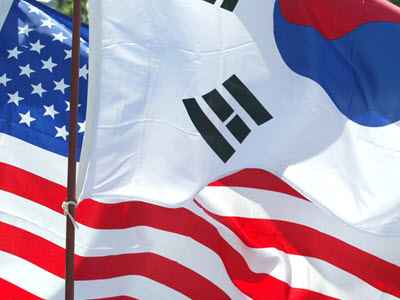Podcast
U.S.-ROK Cooperation in Batteries, Biotech, and Quantum Technologies
In this episode of Asia Insight, Doug Strub hosts a conversation with Jungmi Cha, Charlie Vest, Michelle Rozo, and Hodan Omaar. The discussion examines strategies and policies of the United States and the Republic of Korea (ROK) in the pivotal areas of battery technology, biotechnology, and quantum technology.
This Asia Insight episode complements the NBR report “U.S.-ROK Tech Cooperation: Batteries, Biotech, and Quantum Technologies” (March 2025) and was produced by NBR with support from the Korea Foundation.
Jungmi Cha is a Research Fellow at the National Assembly Futures Institute and a Visiting Professor at Yonsei University in South Korea.
Hodan Omaar is a Senior Policy Manager focusing on AI policy at the Information Technology and Innovation Foundation’s Center for Data Innovation.
Michelle Rozo is Vice-Chair of the National Security Commission on Emerging Biotechnology.
Doug Strub is Senior Director of Research and Programs at NBR.
Charlie Vest is an Associate Director at Rhodium Group and a Nonresident Fellow at NBR.
Timestamps
[00:52] Jungmi Cha joins Doug Strub to discuss the introductory chapter she wrote for the report “U.S.-ROK Tech Cooperation: Batteries, Biotech, and Quantum Technologies.”
[01:10] What are the main driving factors influencing states and strategic approaches to technology development in the Indo-Pacific?
[03:41] What role does U.S.-China competition play in technology development in the Indo-Pacific, and how does it impact technology development in smaller and middle regional powers?
[05:23] What is the outlook for the South Korea’s technological development?
[10:13] Noting the geopolitical and dual use impact of critical technologies, the United States has pursued a strategy of de-risking. Would such a strategy be a good avenue for the ROK? How is South Korea approaching these challenges?
[12:52] Given the environment and the challenges, how important is U.S.-ROK technology and innovation cooperation?
[15:28] What are your thoughts and recommendations on how the United States and South Korea can increase cooperation and advance shared priorities?
[16:47] Charlie Vest joins Doug to discuss his chapter on U.S.-ROK cooperation in the battery sector.
[17:26] As we examine the ROK’s battery investments in the United States and how U.S. trade and investment policies are shaping the market for South Korean battery companies, there is a tradeoff between accelerating electric vehicle (EV) adoption and de-risking supply chains. What are the U.S. policies in this space and what is driving the thinking behind these policies?
[18:37] How have efforts to decarbonize and build up supply chains panned out? What impact have these efforts had on companies investing in the United States?
[20:30] What impact will these efforts have on battery manufacturing specifically and broader supply chains?
[21:35] Attracting foreign investment and de-risking from China are key policy drivers; why is this important for the United States to do?
[23:00] How will broader trade and economic policy shifts, such as increased tariffs and the potential repeal of the Inflation Reduction Act, impact battery supply chains?
[24:09] In 2024, there was a major increase in tariffs for EVs and EV batteries coming from the PRC. What did this shift mean for the United States?
[26:15] What are some recommendations to drive forward and increase U.S.-ROK cooperation in batteries?
[27:50] Michelle Rozo joins Doug to discuss her chapter on U.S.-ROK collaboration on biotechnology.
[28:05] What is biotechnology?
[29:31] What is the current state of the U.S. biotechnology industry?
[30:27] What are the potential implications of biotechnology for the economic and security environment?
[32:10] In 2019, the Department of Defense named biotechnology as a critical technology area vital to maintain U.S. security. In 2022, the United States established the National Security Commission on Emerging Biotechnology. What are the main issues being prioritized from a defense perspective?
[34:22] How is the U.S. government approaching biotechnology, what are the key priorities, and why have policymakers not prioritized biotechnology to the extent they have with AI and semiconductors?
[36:05] China listed biotechnology as one of the seven strategic emerging technologies in 2010. What has China’s approach to biotechnology been and what is the status of U.S.-China competition in this space?
[37:53] What are some of the policy options the United States has to better approach biotechnology?
[39:36] What role could international cooperation play, how is the United States partnering with other nations, and what more could be done in this space?
[40:43] Hodan Omaar joins Doug to discuss her chapter on U.S.-ROK collaboration to advance quantum technology.
[41:10] What are the key quantum technologies being developed today, where is there market opportunity in the United States and South Korea, and what are the applications of quantum policy and development strategies?
[43:04] How is the United States developing quantum technologies? In which areas does the United States excel? In which areas is the United States lagging in comparison to other international players?
[45:07] In terms of the broader U.S. quantum ecosystem, what roles do the government, universities, and private sector play in funding research and development?
[46:32] What is the U.S. government’s strategy for continued quantum development? Have either the executive or legislative branches of U.S. government taken any steps to achieve these key development priorities?
[47:42] The U.S. approach to achieving major long-term breakthroughs put it at risk of ceding early economic and strategic gains to global competitors; how is the United States addressing these developing challenges?
[48:51] When it comes to cooperation between the two countries, how do South Korea’s development strategies, policies, and overall quantum industry compare to that of the United States?
About Asia Insight
The NBR podcast series Asia Insight features interviews with top Asia experts about key issues affecting the Indo-Pacific region, with a focus on implications for U.S. policy and businesses. Subscribe to Asia Insight on Podbean and Apple Podcasts and let us know what you think of the podcast on Twitter.
Media Contact: [email protected] or (202) 347-9767.
Asia Insight theme music is by Laura Schwartz of Bellwether Bayou.
This podcast was edited by Jerome Siangco at NBR.


